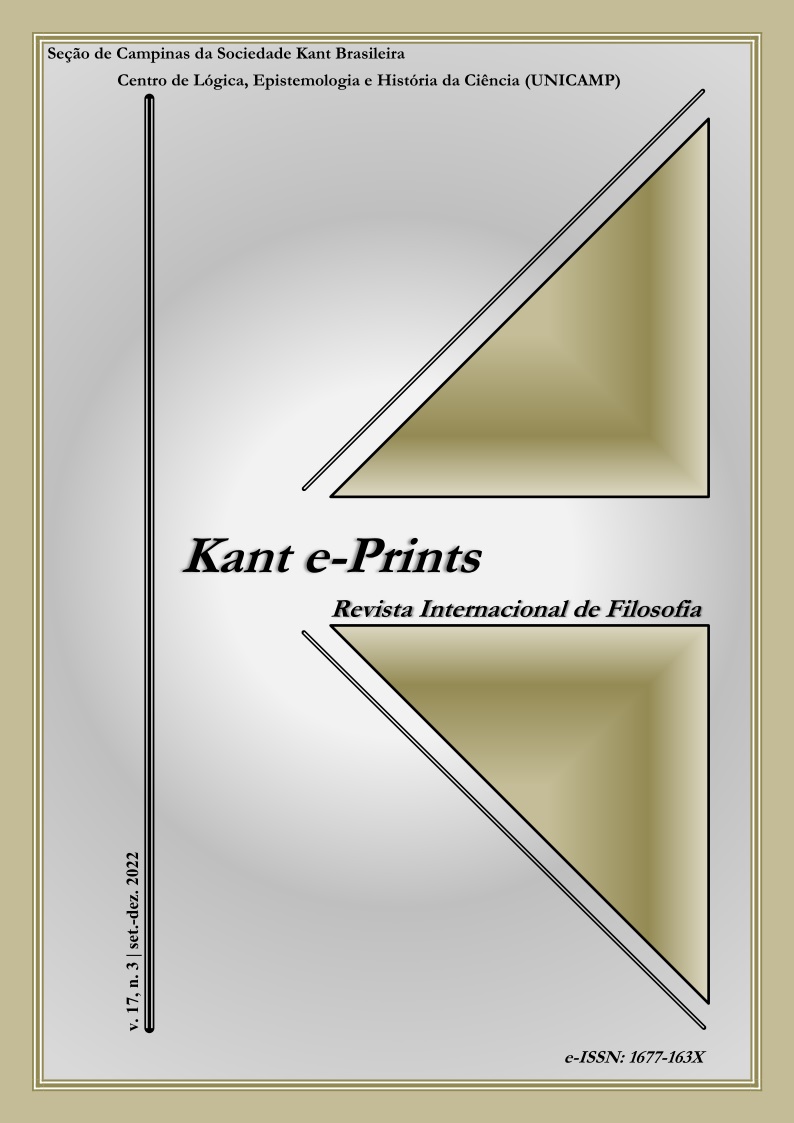Resumo
Neste artigo buscaremos expor e discutir os pontos de contato e os de distanciamento entre as filosofias de Immanuel Kant (1724-1804) e Ernst Cassirer (1874-1945). Para isso iniciaremos a exposição tratando das similitudes, mostrando o sentido do “kantismo” presente no pensamento de Cassirer. Em um próximo passo, trabalharemos na perspectiva de evidenciar os aspectos dissonantes entre os autores, enfatizando a distinção metodológica e a maneira através da qual cada um deles considera a ciência de seu tempo. Finalizaremos o trabalho considerando o papel e a importância assumida pela matriz kantiana presente na epistemologia cassireriana.
Referências
Amaral, L. A. D. (2019). Método transcendental: do legado kantiano à filosofia juvenil de Ernst Cassirer no contexto da escola (neokantiana) de Marburgo. Kant e-prints, 14(3), 93–118.
Beiser, F. (2014). The Genesis of Neo-Kantianism. 1796-1880. Oxford University Press.
Cassirer, E. (1907). Kant und die moderne Mathematik – Mit Bezug auf Bertrand Russells und Louis Couturats Werke über die Prinzipien der Mathematik. Kant-Studien, 12, 1–49.
Cassirer, E. (1953). Substance and Function. In E. Cassirer, Substance and Function and Einstein’s Theory of Relativity. Open Court. (Original work published 1910)
Cassirer, E. (1953). Einstein’s Theory of Relativity. In E. Cassirer, Substance and Function and Einstein’s Theory of Relativity. Open Court. (Original work published 1921)
Cassirer, E. (1991). Das Erkenntnisproblem in der Philosophie und Wissenschaft der neuren Zeit. B. II. Wissenschaftlische Buchgesellschaft. (Original work published 1907)
Cassirer, E. (2001). Filosofia das formas simbólicas. Primeiro Tomo: A linguagem. Martins fontes. (Original work published 1923)
Cassirer, E. (2001). Filosofia das Formas simbólicas. Terceiro Tomo: Fenomenologia do conhecimento. Martins fontes. (Original work published 1929)
Cohen, H. (1871/1885). Kants Theorie der Erfahrung. Ferd. Dümmlers Verlagsbuchhandlung.
Dedekind, R. (1888). Was sind und was sollen die Zahlen. Vieweg.
Ferrari, M. (2015). Ernst Cassirer and the history of science. In J. T. Friedman & S. Luft (Eds.). The Philosophy of Ernst Cassirer: a Novel Assessment (Book 225, pp. 11–29). Books by Marquette University Faculty.
Frege, G. (1884). Die Grundlagen der Arithmetik. Verlag von Wilhelm Koebner.
Friedman, J. T., & Luft, S. (Eds). (2015). The Philosophy of Ernst Cassirer: a Novel Assessment. Books by Marquette University Faculty. Book 225.
Heis, J. (2010). Critical philosophy begins at the very point where logistic leaves off: Cassirer’s Response to Frege and Russell. Perspectives on Science, 18(4), by The Massachusetts Institute of Technology, pp. 383–408.
Kant, I. (1994). Crítica da Razão Pura [1a ed. 1781 – 2a ed. 1787]. Fundação Calouste Gulbekian.
Luft, S. (2018). Kulturphilosophie als „naturalische“ Transzendentalphilosophie und die Frage nach den Ort der Kultur. In H. Busche, T. Heinze, F. Hillebrandt, & F. Schäfer (Hrsg.), Kultur - Interdisziplinäre Zugang (pp. 467–487). Springer.
Natorp, P. (1887). Über objektive und subjektive Begründung der Erkenntniss. Philosophische Monatshefte, 23, 257–286.
Russell, B. (2010). Principles of Mathematics. Routledge. (Original work published 1903)

Este trabalho está licenciado sob uma licença Creative Commons Attribution 4.0 International License.
Copyright (c) 2023 Lucas Alessandro Duarte Amaral

